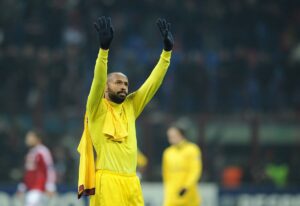With Bayern Munich’s first team away at a short-term training camp in Portugal for most of this week and not much going on beyond that, it may be a good time to honour a special former coach of the side, who recently turned 75 years old. Ottmar Hitzfeld’s career as a coach was filled with more success than most German tacticians. He managed to win the UEFA Champions League with both Borussia Dortmund and Bayern Munich, thus joining a small group of elite managers that have been crowned European champions with more than one club.
Ottmar Hitzfeld’s Career as a Coach
Lis of managers to have won the Champions League with two different clubs:
• José Mourinho
• Carlo Ancelotti
• Jupp Heynckes
• Ernst Happel
• Ottmar HitzfeldEnd of list. pic.twitter.com/QS9oDsQygD
— IM🇵🇹 (@Iconic_Mourinho) May 7, 2022
Swiss Beginnings
Despite being born in Lörrach, Germany, his career as a coach began in Switzerland with Zug 94 in the lower leagues of the country’s football pyramid, He was in charge there for only a single term (1983-84). He then moved on to FC Arau, where he stayed for four seasons and won the Swiss Cup in 1985.
Read More: The Three Greatest Bayern Munich Goalkeepers
In 1988 Hitzfeld moved on to Grasshoppers Zurich, one of the top clubs in the country. With them, he won two national league titles as well as another cup trophy, before moving on to Germany in the summer of 1991.
Borussia Dortmund
Despite some notable success in Switzerland, his career really only took off in Germany. It also took a few years to get Dortmund going after he joined them in the early 1990s. It was not until 1995 that he brought his first piece of silverware to the Westfalenstadion, the Bundesliga title. His team went on to defend that title in 1996, before becoming champions of Europe in 1997, in a thrilling Champions League final that ended 3-1 against the mighty Juventus in Munich’s Olympic Stadium of all places.
After that triumph, the Borussia Dortmund board made perhaps the greatest of a series of mistakes, by promoting Hitzfeld to director of football, while giving the coaching job to Nevio Scala. They never fully regained the kind of glamour they had then, only ever getting close to it decades later under Jürgen Klopp. After the 1997/98 Bundesliga season ended in a disastrous 10th place finish for die Schwarzgelben and an also dissatisfying 2nd place for Bayern, it was only logical for him to accept the offer by Bayern Munich to return to coaching and move to Bavaria to take over there.
Bayern Munich
Things naturally took on a different dimension with him imposing himself inside a dressing room full of “alpha males” such as Stefan Effenberg, Lothar Matthäus, and Oliver Kahn. That first season with Hitzfeld at the helm, Bayern nearly won its first treble in club history, after having triumphed in the Bundesliga and only narrowly lost out in the UCL and German DFB Cup finals respectively. (Only in 2013 and 2020 would the treble dream come true, under Jupp Heynckes and later Hansi Flick.) In any case, they did win the Champions League with Ottmar in 2001. In his first six seasons at the club, he also won the Bundesliga four times and the Cup twice.
Read More: Top Five Bayern Munich All-Time Goal Scorers
He was sacked by the Bayern board in 2004 and replaced by Felix Magath. The latter won two consecutive national league and cup doubles, but in Magath’s third season in charge, the team struggled to qualify for the Champions League. Therefore, Magath was out, and Hitzfeld was back in. He too failed to qualify for Europe’s greatest club competition ahead of the 2007/08 season, but stayed with the team for that term, as Bayern were undergoing a rebuilding process. They made numerous transfers both in and out. The biggest names joining were Franck Ribery and Luca Toni. Following that, Hitzfeld’s run as a coach ended having won the Bundesliga and the German Cup once again. He left the Bavarians once again, as he took a position at a national team close to his heart.
Ottmar Hitzfeld’s Career – A Swiss Ending
Hitzfeld coached the Swiss national side at both the 2010 and 2014 World Cups. At the tournament in Brazil, they made it to the Round of 16, where they were narrowly beaten by Argentina, the eventual losing finalists of that tournament. That defeat turned out to be his last match as a coach of any team. After decades of success, he saw out his career at the helm of a nation that gave him his start and saw them compete in football’s premier international tournament, not once, but twice.






